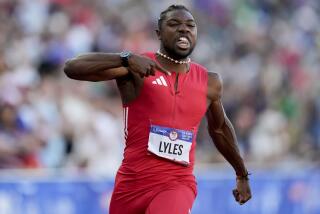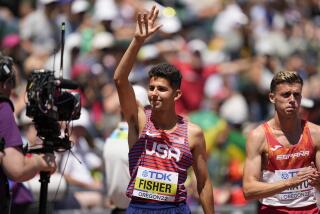U.S. OLYMPIC FESTIVAL LOS ANGELES 1991 : Emotions Soar in Man With Two Countries : South Africa: Maree will compete for the U.S., but his heart is with his former countrymen.
- Share via
For the past week, a flood of memories, mostly about aches and pains, have filled Sydney Maree’s mind and soul.
As a 5,000-meter runner who left his native South Africa and competed for the United States in two Olympic Games, Maree has reflected deeply on the recent announcement that welcomed South African athletes into the international sporting community for the first time in three decades.
He has not forgotten the reason they were isolated--the racial segregation policy known as apartheid.
In 1979, Maree, then competing for Villanova, was about to fly to Lausanne, Switzerland, to run in a meet. But just before boarding his plane, he was told by meet organizers that he could not enter the race because Steve Ovett, the English world record-holder at the time, would not allow it. Ovett refused to run against South Africans.
Maree was offered the chance to run a 1,500-meter race, which he refused. Instead, he used his plane ticket to visit his family in South Africa.
After landing there, he got in a line to retrieve his luggage at the airport. A woman told him he was in the wrong line.
“The line for your people is over there,” the woman told him.
He was dumbstruck.
The world ostracized him because he is South African-born; his country ostracized him because he is black. Such has been the plight of South African black athletes.
Yet, despite the anguish that led him to leave South Africa, Maree said Wednesday during a news conference at the U.S. Olympic Festival that he would return to run for his native country if asked by his mother, Susan.
Maree, 35, said initially he did not consider such an alternative, and believes it will never happen. But . . . .
“You never know who is (influencing) her,” he said.
Maree said the United States embraced him when he was an outcast, and he wants to show his loyalty. He is one of the few Olympians competing in the Festival’s track and field competition, which starts today.
Still, Maree’s heart will be with the South Africans in Barcelona, Spain, at the 1992 Olympic Games. Maree is more motivated to make the U.S. Olympic team so he can mix with his one-time countrymen. If he fails to make the team, Maree will find a way to be present.
“It will be difficult to find a dry spot on my face when I watch them march in,” Maree said. “It was the same feeling in Los Angeles when I first marched in.”
Maree has heard that some South African newspapers already have called for his return. He believes other expatriates will return to represent their homeland.
Maree, who became a U.S. citizen May 1, 1984, said he does not know what it would take to reverse a change in citizenship, but if enough pressure is exerted by officials of the sport’s governing bodies and the sporting public, accommodations could be made.
“In order to field a credible team they need a couple of veterans.” Maree said. “But I strongly feel this is where I belong, this is where I should be.”
Maree’s attitudes have changed greatly since he first came to the United States in 1979. He recalled his confusion over sharing a room with Villanova teammate Chris Rose, who is white.
“I had not had the opportunity to observe white people,” Maree said. “So, I would lie awake in bed and watch Chris Rose--watch how he got up and brushed his teeth, that snored the same way we would snore. I studied Chris the first semester just to see how white people behave, how different they are from what I had known.”
The lesson was well learned: People are the same; it is governments that make them different.
More to Read
Go beyond the scoreboard
Get the latest on L.A.'s teams in the daily Sports Report newsletter.
You may occasionally receive promotional content from the Los Angeles Times.






